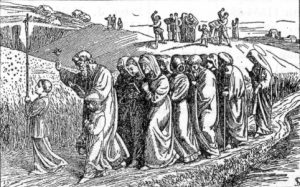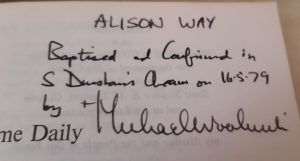Link to Rev Alison Way’s video reflection and rogation litany https://youtu.be/A6Co9S2ht1g
Acts 10:44-end, John 15:9-17
In the name of the Living God: Loving Father, Risen Son and ever present Holy Spirit, Amen
The sixth Sunday of Easter is traditionally the trigger to start 3 days of prayer called rogation in the lead up to Ascension day on Thursday. If we have been using the daily prayer resources we have been praying for rogation in the week just passed. The word rogation comes from the latin to ask and was inspired by the collect for this Sunday in the book of common prayer, which includes whatsoever ye shall ask for in my Name – he will give it you. These words of Jesus were also found towards the end of the gospel set for today.
called rogation in the lead up to Ascension day on Thursday. If we have been using the daily prayer resources we have been praying for rogation in the week just passed. The word rogation comes from the latin to ask and was inspired by the collect for this Sunday in the book of common prayer, which includes whatsoever ye shall ask for in my Name – he will give it you. These words of Jesus were also found towards the end of the gospel set for today.
Originally rogation was adapted akin to some Greek and Roman traditions, and included praying for the crops via an annual procession, and the marking of parish boundaries. This was one of the things that was surpressed during the reformation, being restored once again in 1559. The poet and priest George Herbert who was based not too far from here in a rural parish near Salisbury said of this occasion.
Rogationtide should be about asking God’s blessing upon the fields, a sense of justice in keeping the boundaries of the fields, caring for each other, in the model of the village walking together as it beat the bounds, offering a time for reconciliation and friendship, and care for the poor by the distribution of charity.
Let’s take those ideas in turn and dwell a little within their wisdom – It is always important to pray for the land and those who work it – all the different types of crops and livestock. Perhaps we could take a moment and pause here to think about what issues there might be. For example we will have read in the press about issues with the lack of workers to gather essential harvests. This was certainly true for some bulb growers earlier in the year and has the potential to impact our soft fruit harvest. There are also impact on any harvest that is traditionally exported and how that is working (particularly problematic for the harvest of fish, fish farming and seafood). When I spoke to Charles Buckler his first thought was the need for rain, so the grass would grow better to feed his livestock. The very cool dry spring is another concern and maybe we should be evoking the prayer book prayer for rain and warmth to swell the grain!
Other things we should reflect on and pray for are all those who bring the food we eat to our tables in all the aspects of the food supply chain. We have choices we make day by day in how we live lightly on the ground God has given us.
Our gospel reading today has given us one of the many growth and growing analogies that Jesus used. It goes like this:-You did not choose me but I chose you. And I appointed you to go and bear fruit, fruit that will last. This is interesting – fruit by in large doesn’t last! It has a moment of peak ripeness and tastiness (and then quite quickly starts to rot!). Fruit only lasts with our intervention, and we have become quite inventive over the years in intervening. In a way in this instance our fruitfulness and that lasting says more about the work of the Holy Spirit in us – which makes that so! The Holy Spirit has always been inventive in intervening!
Interestingly the fruitfulness Jesus is most asking for us is that we love one another, which is another theme that George Herbert takes up with his thoughts about caring for each other in the sense of a small community. What George Herbert said was caring for each other, in the model of the village walking together as it beat the bounds, offering a time for reconciliation and friendship. It is interesting what we have learnt about our friendships in recent times. I don’t know about you but I have been managing in recent weeks to see a few family members and a handful of friends. Mostly those relatively local to here! It has been such a joy to actually see people – rather than talk on the phone or on a screen. Friends have always been important to us – I think we understand that in a refreshed way now! Up to now I have always enjoyed a chinwag over a good cup of coffee! It will be good when we can do that more and more in the days ahead.
Friendship plays a key role in our relationship with Jesus too, Jesus says in our gospel passage- I have called you friends. This is to indicate the kind of relationship we are to have with Jesus based on love, support and companionship. This is not a relationship based on compulsion or having to follow orders. It is about our commitment not Jesus commanding us. It has to be that way so it is a conscious choice on our part. We are not mindless automatons – we are free spirits. There is a selection of responsibilities on us in being Jesus’ friends – which is all about the fruit stuff I was talking about before.
This verse John 15 15 – I do not call you servants any longer, because the servant does not know what the master is doing; but I have called you friends, because I have made known to you everything I heard from my father – has travelled with me for a long time – it was preached at my confirmation many moons ago! The preacher was Bishop Michael Marshall, the then Bishop of Woolwich who went on to be one of the evangelists in the decade of evangelism at the turn of the Millennium. It made a deep impression on me at the time, partly because Bishop Michael reminded us that the word we hear as servant (who does his master’s bidding) could also be translated as slave (with no rights at all). What Jesus offers us in friendship is a very, very long way from being his slave. It is about all of us – following the way God has for us – responding to his call. It is a heart, mind and body thing, not just something we are doing because we are ‘owned’ like a slave.
all). What Jesus offers us in friendship is a very, very long way from being his slave. It is about all of us – following the way God has for us – responding to his call. It is a heart, mind and body thing, not just something we are doing because we are ‘owned’ like a slave.
A final part of what George Herbert attributes to rogation is about reconciliation and recognising boundaries. Reconciliation is good for us, and something that should characterise our abiding in God’s love for us as described by Jesus in this gospel. Holding on to bitterness and malice towards others is bad for us – I am not saying seeking reconciliation is always easy but it is the way Jesus would have us walk if we can. (I appreciate there are some circumstances where it is not possible or practical.)
George Herbert’s take on boundaries also struck me. He said a sense of justice in keeping the boundaries of the fields. Though originally this is about recognising what is yours from mine, in crops and livestock terms this is clearly not taking what is not ours. Using the phrase ‘a sense of justice in keeping the boundaries’ can be applied much more widely. A sense of justice means recognising when our society and our world order favours one over and against another, and doing whatever we can to try to break down such injustices. This is a big topic, but again plays into our sense of loving one another and bearing fruit. Ultimately Jesus is asking us to dig deeper (not always easy) and reminds us earlier in this reading of the consequences, where I will finish these reflections.
Jesus said – I have said these things to you so that my joy may be in you and that your joy may be complete.
Let us pray
God of all, we give you thanks for the gift of friendship: for the giving and the receiving; for the opportunities and the challenges; for the laughter and the tears; for the conversations and the silence; for the moments and the memories. Draw us deeper into your love and your joy in us and bless us with the confidence to proclaim Jesus as our dearest friend, teacher and Saviour. We ask this in his name. Amen.
References: New Revised Standard Version Bible: Anglicised Edition, copyright © 1989, 1995
Copyright acknowledgement Some material included in this service is copyright: © The Archbishops’ Council 2000-2020 and from the book of Common Prayer
The prayer is from www.rootsontheweb.com and is copyright © ROOTS for Churches Ltd. Reproduced with permission.
